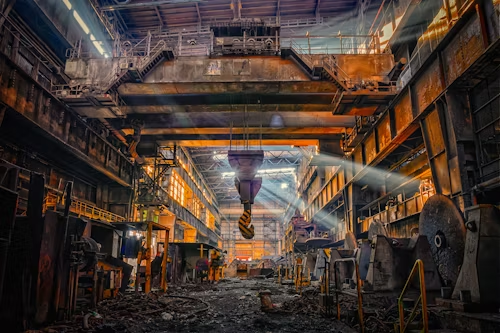The UK government has unveiled a major plan to protect the country’s steel industry. This effort comes as the sector faces rising costs and the threat of trade tariffs. The goal is to cut production expenses, boost domestic steel use, and ensure long-term sustainability.
One key concern is the impact of unfair foreign competition. UK officials say low-cost steel imports hurt local producers. This announcement follows US President Donald Trump’s decision to impose a 25% tariff on steel imports starting March 12. Industry leaders worry these tariffs could cause millions in lost trade.
Government’s Steel Strategy
Business Secretary Jonathan Reynolds has launched a consultation on the government’s new Plan for Steel. This follows a pledge of up to £2.5 billion in industry support. The consultation will focus on long-term challenges and strategies. While it does not directly address US tariffs, Reynolds said the goal is to “protect industrial heartlands, secure jobs, and boost economic growth.”
The government’s plan includes:
- Expanding domestic steel production.
- Prioritizing UK-made steel in major projects, including Heathrow Airport expansion.
- Improving scrap processing capabilities to reduce reliance on steel imports.
- Investing in energy-efficient electric arc furnaces.
- Exploring ways to lower electricity costs for steelmakers.
- Preventing the market from being flooded by cheap foreign steel.
The Department for Business and Trade (DBT) emphasized that the strategy would help the steel industry overcome long-standing difficulties. However, Shadow Business Secretary Andrew Griffith criticized the government for not addressing tariffs directly. He argued that officials should negotiate with the US to avoid economic damage.
Concerns Over US Tariffs
Despite the government’s broad support plan, it has not explicitly addressed the impact of US tariffs. Industry experts warn that failing to act could lead to major setbacks. UK Steel, the trade body representing the sector, stated that Trump’s tariffs could significantly harm British producers.
Reynolds noted that the UK could argue for an exemption from US tariffs. He pointed out that British steel exports to the US are relatively small and serve strategic industries such as defense. However, if the US does not grant an exemption, UK manufacturers may struggle to compete. The industry generates around £400 million in annual trade with the US. Any restrictions on exports could be damaging.
Another concern is the ripple effect of US tariffs on the global steel market. If steel producers in other countries cannot sell to the US, they may lower their prices elsewhere. This could make it even harder for UK steel companies to compete.
Impact on Jobs and Local Communities
The government has pledged to support jobs and secure the steel industry’s future. Financial aid will be available to steel-producing areas such as Scotland, Scunthorpe, Rotherham, and Redcar. Funding will come through the National Wealth Fund, which collaborates with private investors and local authorities.
Despite these efforts, UK steel production has seen a sharp decline in recent years. Tata Steel is replacing traditional blast furnaces with electric arc furnaces at its Port Talbot plant in Wales. This transition is expected to result in 2,800 job losses. British Steel is also making similar changes in Scunthorpe, which could lead to another 3,000 redundancies.
Industry leaders and workers’ unions say these job losses highlight the urgent need for government action. The GMB union called the plan “desperately needed” after years of uncertainty. National Secretary Andy Prendergast stressed that keeping domestic steel production is crucial for economic stability and national security.
Future of UK Steel
Gareth Stace, Director-General of UK Steel, praised the government’s commitment to the sector. He said the consultation will help shape a formal steel strategy, set to be released in the spring. Stace emphasized that a well-structured plan could reverse the industry’s decline.
Experts say the UK must address key issues like high energy costs and foreign competition. Griffiths, the Shadow Business Secretary, said he wants to see a clear strategy to help UK steelmakers. He urged the government to take urgent steps to reduce electricity costs and protect the sector from unfair competition.
As the government finalizes its plan, the steel industry awaits further details. Many hope that strong policies will help UK steel regain its competitive edge. For the latest updates on this issue, visit Euro News 24.
